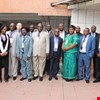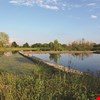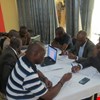

OSS calls for tenders for updating a proposal to Adaptation Fund

Local leaders in the Bhutan districts of Tashi Yangtse and Samdrup Jongkhar participated in GWP workshops to learn about integrated water resources management (IWRM).

GWP Caribbean teamed up with its partners, the Caribbean Youth Environment Network-Jamaica Chapter (CYEN-Ja) and the Water Resources Authority (WRA) of Jamaica, to host a Rainwater Harvesting (RWH) Outreach Initiative at the Jamaica Climate Walk 2015.

The Global Water Partnership – Mediterranean (GWP-Med) has established a long-term, mutually benefitial collaboration agreement with the General Department for Planning and Conservation of Agricultural Lands at the Tunisian Ministry of Agriculture on integrating climate change considerations in the latter’s new water and soil preservation planning, as well as on developing a territorial planning methodology using the Douimis basin as a pilot case.

From 22- 23 October 2015, the Global Water Partnership Eastern Africa (GWPEA) conducted a regional workshop themed “ Role of the media in promoting water security, climate resilience and drought risk management”. The workshop was attended by 15 media practitioners from Uganda, Kenya, Rwanda, Burundi, Sudan, Ethiopia and Djibouti.

The workshop on the mobilization of Economic Community of Central African States (ECCAS) experts for reshaping hydrological norms was held in Douala, Cameroon from October 20th to 21st, 2015.
This workshop was implemented within the framework of the project known as RESIHYST Africa Project “Hydrological standards reviewing for resilient hydraulic infrastructure to climate change in Africa “. It was organized by UNESCO in collaboration with the Economic Community of Central African States (ECCAS).
This workshop brought together ECCAS’ experts in database management, GWP-CAf expert officials from ministries of water, transport, public works and focal points of International Hydrological programme (IHP) from Burundi, Cameroon, Chad, Central African Republic, Congo, Democratic Republic of Congo, Sao Tome and Principe as well as representatives of universities and hydrological research center.

Global Water Partnership Central and Eastern Europe releases today a new publication Guidelines on Natural Small Water Retention Measures.

One of the critical challenges facing the water sector is climate change. Studies have shown that Uganda is highly vulnerable to climate change and variability. This means that the economy and wellbeing of its people are tightly bound to climate. This has been demonstrated by increasing climate variability and occurrences of floods and droughts over the last two decades. These changes are likely to have significant implications for water sources, agriculture, food security, and soils.

From 29th to 30th September, 2015 the meeting of the “Taskforce” for the development of central Africa regional hdyro-meteorological strategy was held in Douala, Cameroon. It was organized by the Economic Community of Central African States (ECCAS) in collaboration with GWP-CAf.
In addition to ECCAS and GWP-CAf’s experts, the meeting was attended by national experts in meteorology and hydrology from Cameroon, Congo, Chad, DR Congo, Gabon and Sao Tomé é Principe as well as representatives of UNESCO and Lake Chad Basin Commission (LCBC).
The “Taskforce” meeting planned during a working visit conducted by GWP-CAf to Economic Community of Central African States (ECCAS) in July 2015, enabled experts to better understand the regional hydrometeorological strategy elaboration process and approve the regional synthesis report of baseline studies for National Hydrological and Meteorological Services conducted in six (6) pilot countries in Central Africa. The road map for the development of regional hydro meteorological services strategy in Central Africa was also discussed and approved.

Global Water Partnership (GWP) welcomes the aspirational 2030 Agenda for Sustainable Development adopted by Member States at the UN General Assembly on September 25, 2015. The transformational vision of the agenda is ambitious and will need an unwavering commitment on the part of everyone. GWP SAS will play its part.